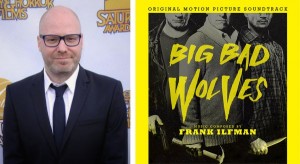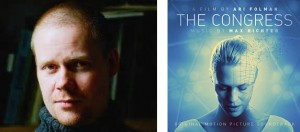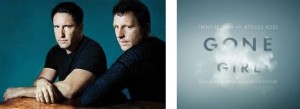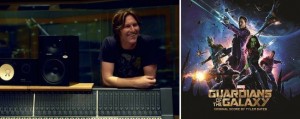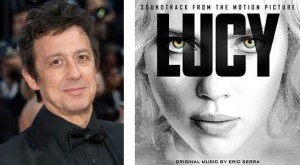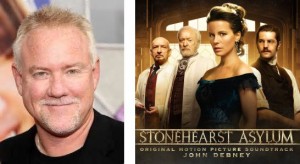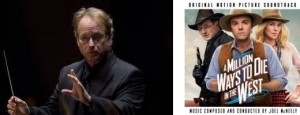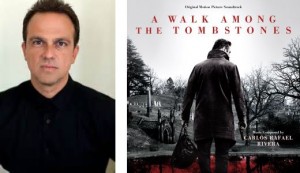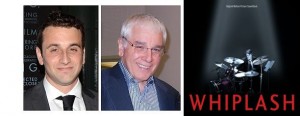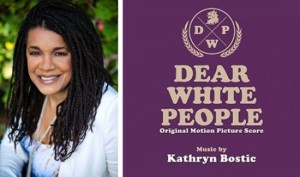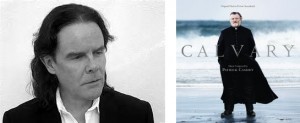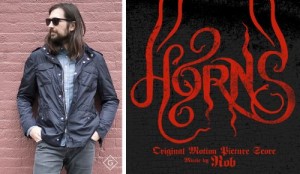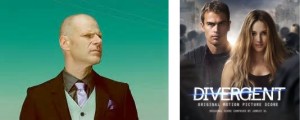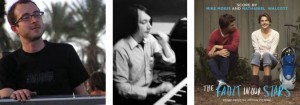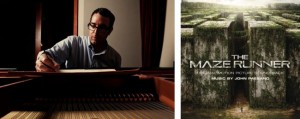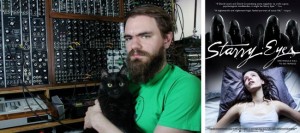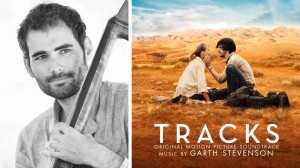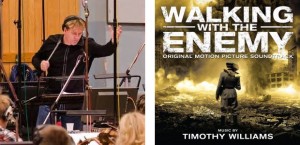THE BEST SCORES OF 2014 – The Runner Up’s and Composers To Watch
BIG BAD WOLVES
(Frank Ilfman / Movie Score Media)
Stop me if you’ve heard the same cinematic tune about a perceived miscreant tied into a chair for all manner of mental, and physical torture to be performed upon him. Thankfully, the Israeli breakout film BIG BAD WOLVES whistles the genre song with smashing black-humored suspense, as captured with a thunderous score by Frank Ilfman, who twists a thrillingly mean symphonic knife as he relentlessly veers between frantic action and sly, Herrmann-esque strings as a set-up for ironic, tragic outrage that hammers home that these sort of confessionals never turn out well – even if Ilfman’s work is full of truly twisted satisfaction.
THE CONGRESS
(Max Richter / Milan Records)
The blurring between animated, and real worlds gave composer Max Richter and filmmaker Ari Folman their breakout works with 2008s WALTZ WITH BASHIR where a shell-shocked Israeli soldier tried to come to grips with his country’s invasion of Lebanon. Now the mesh of flesh and blood with cartoon imagery reaches an epically imaginative peak with “real” actress Robin Wright’s headspace to provide a striking meditation on art, commerce and politics with a film, and score that are the height of bizarre, artistic illusion. A musician in the tradition of John Adams and Michael Nyman, Richter uses long, ever-developing string lines to create a mood of suspended virtual reality, his beautifully floating, dream-like melodies creating a true sense of importance for a life-capturing technology bravely flowing into a new animated frontier, given a classical sensibility with its mutations of Schubert, along with plaintive strings and pianos – until the rudeness of Hollywood exploitation and a maniac toontown come rushing in with rocking, guitars and bubbling videogame-like rhythms. There’s a feeling of transcendent grace and commercial subversion to this very smart CONGRESS that feels musically metaphysical in the smartest, and most graceful way even with far-out animation bashing at its walls of peaceful, melodic illusion.
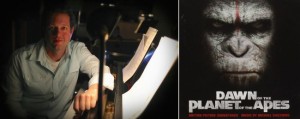
Michael Giachhino (photo Deborah Coleman/Pixar) DAWN OF THE PLANET OF THE APES soundtrack | ©2014 Sony Classical
DAWN OF THE PLANET OF THE APES
(Michael Giacchino / Sony Classical)
If there’s an heir apparent to Jerry Goldsmith’s throne of mixing savage rhythms with orchestral melody, then Hollywood should be bowing down before the chest-thumping energy of Michael Giacchino, who follows up his track record with fantastical franchise reboots like MISSION: IMPOSSIBLE and STAR TREK with what’s arguably the best PLANET OF THE APES picture new or old. A true enthusiast of the composing lawgivers before him, particularly APES musical pioneer, Giacchino brings in all manner of inventive primitive percussion to create an ape society, while using a terrifically explosively thematic orchestra when it comes to their reckoning with the remaining human survivors. His furious, adrenalin-charged action writing makes this score feel like a true evolution from the time we walked through The Forbidden Zone. But it those first talking simians were mostly villainous with Goldsmith’s neo-experimental approach, Giacchino’s movingly noble orchestra and choral finery truly hails Caesar with the soaring, gong-ringing, myth-making rush of a Christ figure that truly shows how the series has developed its viewpoint that animals are more musically virtuous than any Homo sapien in musical sight.
GONE GIRL
(Trent Reznor & Atticus Ross / Columbia)
No two composers are insinuating a nightmarish industrial sound into alternative scoring like Nine Inch Nails’ guitarist Trent Reznor and band collaborator Atticus Ross. After director David Fincher caught the razor-scratching NiN earbug by using the song “Closer” over SEVEN’s diseased killer journal opening, the director brought in the Reznor and Ross to created the ever-mutating, high tech sound of THE SOCIAL NETWORK to the tune of an Oscar, before creating a rhythmically sinister snowscape for THE GIRL WITH THE DRAGON TATTOO. But where Reznor and Ross have embodied David Fincher’s twisted psychology to in-your-face musical effect, the duo have now produced a score that works so brilliantly because of its mostly subtle insinuation with GONE GIRL. Becoming the scheming housewife from hell, Reznor and Ross use their distinctively eerie fusion of alternative rock of surreal percussion to create trouble in flyover suburban paradise, cooing with sensual humor before their rhythms become far more disturbing. Otherworldly layers of synth and sample overdubs tear off the gift-wrapping from the perfect woman to shimmering, nightmarish effect as the music becomes progressively unraveled. Yet the score is never less than mesmerizing, unable to break apart from a black widow’s spell, her web of deceit weaved with equal parts black humor, suspense and shock to clever, surreally psychotic electro-shock notes.
GUARDIANS OF THE GALAXY
(Tyler Bates / Hollywood Records)
Marvel took a big gamble on a STAR WARS goof with a third-tier group of nearly forgotten superheroes, one that paid off in smash hit spades with a winning combo of heart and humor that also delivered on the space opera – no more so than with the thrilling eccentricity of Tyler Bates’ score, as delivered by a composer whose last musical comic book (ahem, graphic novel) team was DC’s ultra-serious WATCHMEN. Sure we might have feared what Bates’ score was going to sound like, especially given how GUARDIANS spent so long promoting itself with Peter Quill’s admittedly awesome mix tape of 60s and 70s oldies. But what Bates delivered in his biggest score yet was a rousing tribute to a certain 1977 score from grandpa John Williams, delivering all of that symphonic style’s thematic goods, while eccentrically goosing them up with ethnic alien-isms and a rock and roll action energy. It’s sci-fi superhero scoring where epic attitude is truly everything.
LUCY
(Eric Serra / Back Lot Music)
No one had quite heard a hitwoman played with the exotically energetic, percussion-funk approach of Eric Serra’s career-making hit for LA FEMME NIKITA back in 1990. Though Serra’s sense of rhythmic experimentation has never ceased in his continued action ventures for filmmaker Luc Besson, LUCY builds upon THE FIFTH ELEMENT’s satiric sci-fi approach, takes the composer into the gonzo stratosphere as a very reluctant drug mule attains brainiac goddess-hood. Starting out with dark, menacing, beats for the terror of an interior super-drug, Serra gradually evolves the score with an eerie reverse-beat theme, trip-hop rock, pokey jazz and militaristic marches, finally going for the cosmic rush of a chorus-powered orchestra.LUCY plays like action scoring on something way stronger than LSD, creating a wildly stylistic score where it delightfully seems anything can happen.
STONHEARST ASYLUM
(John Debney / Lakeshore Records)
Those listeners who felt like they were given the shock treatment by John Debney’s nerve-jangling industrial score for the serial killer chase of director Brad Anderson’s THE CALLER will no doubt be pleased with the stormily old-school melodic suspense that fills their latest venture inside a place where the inmates have truly taken over the asylum. Debney’s thick, thrilling walls of symphonic sound are far more sympathetic here, if no less wary when it comes to representing the plot’s unhinged, build to a bravura trail of mysterioso music, its discoveries alternately playful, romantic, and terrifying. Lilting violins, piano and waltz melodies give STONEHEARST ASYLYUM a costumed sense of time and place before Debney brings matters to a fiery fore by unleashing some of the most exhilarating, emotionally propelled action writing of the year. Rarely has the sound of 40s Hollywood bedlam been given a vibrantly welcoming, or insanely entertaining therapy as in this ASYLUM.
A MILLION WAYS TO DIE IN THE WEST
(Joel McNeely / Back Lot Music)
As one of the ’90s stand-out symphonic composers with such nostalgically bountiful works as RADIOLAND MURDERS, IRON WILL and SQUANTO, Joel McNeely has since explored TV territory in the AMERICAN DAD! company of master wise-ass Seth McFarlane. Certainly one of the biggest soundtrack thrills this year was hearing McNeely get another major Hollywood shot as he played straight man to McFarlane’s ode to BLAZING SADDLES, riding along with the vibrant spirits of Jerome Moross, Alfred Newman, Elmer Bernstein and Bruce Broughton with nary a tip of the musical hat to the profane shenanigans around him. But then in today’s company town, you almost have to do a throwback movie to hear the kind of unapologetic, rip-roaring thematic melody on display as McNeely delivers everything you’d want to hear in a traditional western score and then some, from vast Big Country strains to hoedowns and a twanging guitar and brass showdown – with even a Stephen Foster “Moustache Dance” thrown into a symphonic range that John Wayne would certainly love riding in if he didn’t know better.
A WALK AMONG THE TOMBSTONES
(Carlos Rafael Rivera / Varese Sarabande Records)
That fact that Liam Neeson’s distinctly un-TAKEN strut into SEVEN territory was way to disturbing for his usual action hero audience takes nothing away from this stunningly gritty movie’s aura of despair and depravity, a haunted mood disturbingly accentuated by Carlos Rafael Rivera in the year’s most unsung, and electrifying composing debut – one made all the more unnerving by its subtlety Rivera’s background as a guitarist serves him well in allowing director Scott Frank to create a throwback mood to a distinctly 70s vibe of conspiratorial menace, its music practiced by such past composers as Michael Small and David Shire. Rivera impressively follows in their dark, gripping footsteps with shivering, lonely orchestrations and ghostly voices, yet somehow gives some small sense of hope for the human spirit as his score pays memorable, thematic penance for the sins of the cop past among the truly haunting, melodic tombstones that Rivera’s music lies at our feet.
WHIPLASH
(Justin Hurwitz & Tim Simonec / Varese Sarabande Records)
As the jazz sound and fury of a sadistic student-teacher relationship percussively blasts through cutthroat classrooms and performance halls to the tune of a standard-turned-nightmare, composer Justin Hurwitz gets inside our poor hero’s head like the buzz after a bomb explosion. It’s a novel way of stripping down jazz-friendly instruments into a nightmarish mental drumkit, relentlessly pounding, or humming away like the sound of musical possession that takes a poor kid right over the abyss of hoped-for fame. In a less impressionistic realm, Hurwitz cannily creates a theme for “Whiplash’s” soul destruction that transforms from a spare, despairing piano into a cool cat performance from its beyond hard-ass instructor, conveying the idea of a wolf in sheep’s clothing who twists the free-form nature of the art form into something restrictively relentless. Tim Simonec handles WHIPLASH‘s more traditional jazz duties with equal aplomb, creating warm-ups and a swinging big band piece, with his name announced onstage to inspire career-ending dread from our hero. But then, every composer should be so lucky to get a shout out in the best film of the year.
THE COMPOSERS TO WATCH
Kathryn Bostic has her satirical, smooth way with the oblivious college uppercrust, and their particularly snooty composer named Schubert in her bitingly elegant, and soulful plea to DEAR WHITE PEOPLE (Lakeshore Records)
Irish composer Patrick Cassidy has Catholic guilt to spare in his elegiac orchestra, ringing church bells and anguished chorus that lead a priest to an undeserved penance in the beautifully tragic CALVARY (Varese Sarabande)
Robin Courdert (aka Rob) twists about satanic horror with the chorus of avenging angels and a moving theme for true love rendered asunder as he gives a dark fairy tale point to HORNS (Lakeshore Records)
Hans Zimmer knows to pick rhythmic protégés, with the Superman and Mad Max-bound Junkie XL (i.e. Tom Holkenborg) first impressing with pumped up Spartan percussion in “301” before showing exactly what class of creative multiplex composer he’s meant for, creating a rocking YA world built on engaging electro-beats and lavish orchestral empathy for DIVERGENT (Interscope)
Two teens with cancer might engender all sorts of weepy bravery-in-the-face-of-death music. Instead, the Bright Eyes duo of Mike Mogis (L) and Nathaniel Walcott (R) take an approach that’s filled with ethereal, alternative life, its guitar chords and dreamy electronics truly representing the kind of poetic mood music these refreshingly honest teens would be listening to as they find THE FAULT IN OUR STARS (Atlantic)
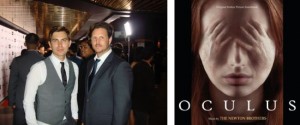
Tayor Newton Stewart and Andy Grush (The Newton Brothers) OCULUS soundtrack | ©2014 Varese Sarabande Records
Ok. They aren’t really The Newton Brothers. But Tayor Newton Stewart (L) and Andy Grush (R) are bound by musical blood with an impressive sense of invention that’s now really paying off, especially as they look into the a terrifying mirror world, and hear a dimension of pulsing sound whose samples, damned voices and slithering strings are the truly scary equivalent of ghost-filled glass for OCULUS (Varese Sarabande Records).
John Paesano takes the YA kid gloves off big time with take-no-survivors, symphonically tribal sci-fi action that thrust a “Lord of the Flies”-ish teen society into the most rampagingly thrilling music this side of Jurassic Park, while also slamming home an awe-inspiring sense of apocalyptic realization for THE MAZE RUNNER (Sony Classical)
Everything synth is wonderfully retro again as Jonathan Snipes brings a enticingly evil, thematically glistening John Carpenter/ Goblin-esque sensibility to the Hollywood cult of STARRY EYES (out soon on Waxworks) while Tom Raybould powerfully evokes the darkly futuristic “Blade Runner” work of Vangelis in the coldly sensuous form of THE MACHINE (Movie Score Media)
Garth Stevenson takes a poetic, 1,700-mile long voyage with a restless female spirit through an Australian outback of drifting strings and alternative rhythms, a quest that lyrically encompasses as much outer beauty as it is does an inner, psychologically longing attitude in his beautifully transfixing, subtly world music score for TRACKS (Lakeshore Records)
Given a film that tells its unbelievably true story of a Jewish fighter donning Nazi garb to save his fellow Hungarians with a scope, and sense of heroic melodrama that could have accompanied any anti-Hitler Hollywood movie made in the 1940s, Timothy Williams’ score resounds with a thrillingly old-school symphonic approach that delineates good and evil with a passionately thematic approach for WALKING WITH THE ENEMY (Phineas Atwood Productions)
AGREE? DISAGREE? LET YOUR VOICE BE HEARD – COMMENT BELOW
Related: The Year in Review: The Best Scores of 2014
Clink on the link: More ASSIGNMENT X soundtrack reviews
Follow us on Twitter at ASSIGNMENT X
Fan us on Facebook at ASSIGNMENTX
Article Source: Assignment X
Article:The Year in Review: The Best Scores of 2014 – The Runner Ups and Composers to Watch
Related Posts:





